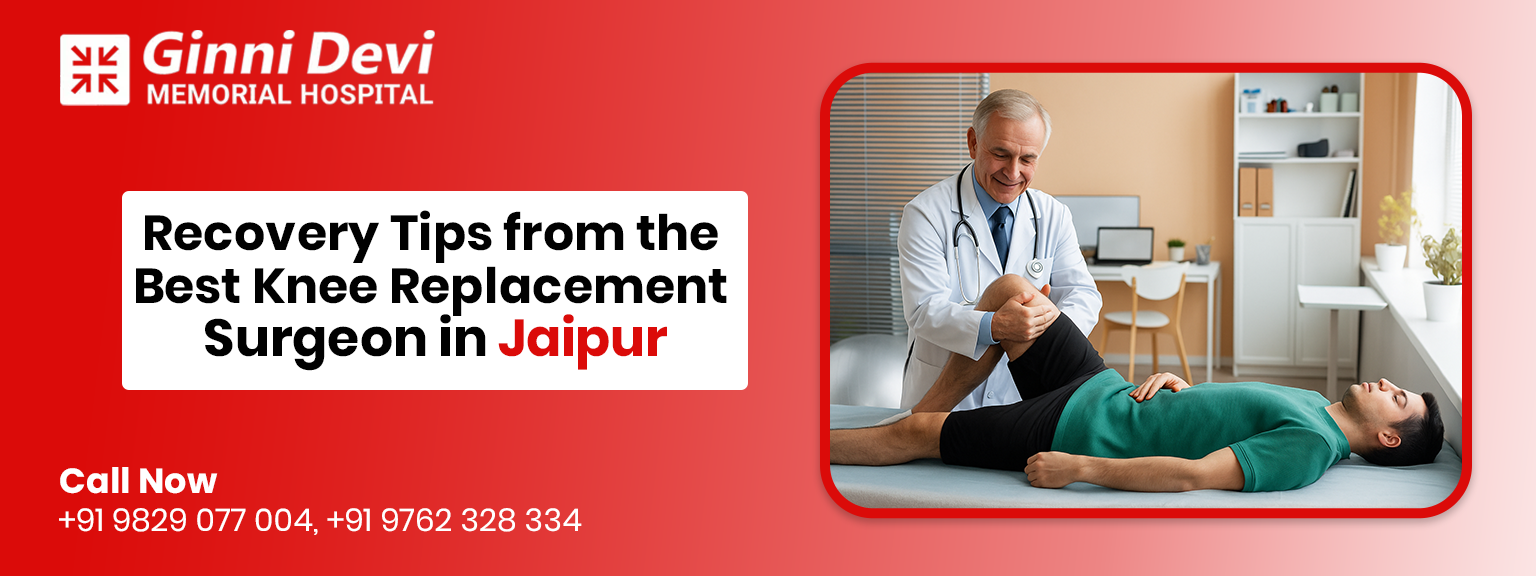Knee pain and joint stiffness can be life-limiting, making even simple daily activities such as walking, climbing stairs, or sitting comfortably a challenge. For many patients with advanced knee arthritis or severe joint damage, knee replacement surgery provides an opportunity to regain mobility, alleviate pain, and enhance overall quality of life.
At Ginni Devi Hospital, Dr. Pratul Jain, regarded as the Best Knee Replacement Surgeon in Jaipur, has helped numerous patients achieve successful outcomes with advanced surgical techniques and compassionate care. However, the surgery itself is just the first step. A smooth and effective recovery process is equally important to ensure long-term success.
In this blog, we will explore essential recovery tips recommended by experts that can help patients heal more quickly, regain mobility, and return to an active lifestyle after undergoing knee replacement surgery.
Recovery Tips from the Experts
Here are some essential recovery tips recommended by Dr. Pratul Jain at Ginni Devi Hospital, ensuring you regain strength safely:
1. Follow Post-Surgical Instructions Carefully
After your knee replacement procedure, your surgeon and medical team will provide detailed post-operative instructions. These include wound care, medication schedules, physical therapy guidelines, and restrictions on movements. Following these instructions closely reduces the risk of complications such as infections, blood clots, or delayed healing.
Dr. Pratul Jain emphasizes that patients who stay consistent with their recovery plan see faster improvements compared to those who skip steps or delay exercises.
2. Start Physical Therapy Early
Physical therapy is a cornerstone of knee replacement recovery. Most patients begin light physiotherapy within 24 hours after surgery. These guided exercises help strengthen the muscles around the knee, improve flexibility, and restore mobility.
Some important physiotherapy goals include:
- Regaining the ability to walk with support (walker or crutches)
- Restoring the range of motion in the new joint
- Strengthening thigh and calf muscles for stability
Consistent therapy under professional supervision ensures gradual progress and prevents stiffness.
3. Manage Pain Effectively
Pain management is crucial in the early recovery phase. Your doctor may prescribe pain-relieving medications or recommend techniques such as ice packs to reduce swelling and discomfort.
Pain should not discourage you from doing physiotherapy exercises. In fact, controlled movement helps reduce pain over time. Always consult your surgeon before adjusting medications to avoid side effects.
4. Maintain a Healthy Diet
Nutrition plays an essential role in healing after surgery. A balanced diet rich in protein, vitamins, and minerals supports tissue repair and bone strength. Some dietary tips include:
- Protein sources such as lentils, eggs, and lean meats are needed to repair tissues
- Calcium and vitamin D for bone health
- Fibre-rich foods to prevent constipation caused by pain medications
- Hydration to support overall recovery
Avoid excess sugar and processed foods, as they may slow down healing and contribute to weight gain, adding unnecessary stress to the new joint.
5. Prevent Infections and Complications
After surgery, the wound area must be kept clean and dry to prevent infection. Watch out for signs like redness, swelling, discharge, or fever, and report them immediately to your doctor.
Additionally, some patients are at risk of blood clots after surgery. Simple steps such as wearing compression stockings, performing light ankle movements, and taking prescribed blood-thinning medications can help reduce this risk.
6. Use Assistive Devices Wisely
Walking aids such as walkers, crutches, or canes are often required in the initial weeks. These devices provide stability and reduce pressure on the healing knee. Gradually, as strength improves, patients can transition to walking independently.
Avoid over-reliance on walking aids for too long, as this may slow down recovery. The goal is to use them only as much as necessary until balance and strength are restored.
7. Practice Proper Sleep and Rest Positions
Good rest is important for tissue repair and recovery. Patients are advised to:
- Sleep on their back with a pillow under the surgical leg for support
- Avoid crossing legs, as it may strain the new joint
- Use a firm mattress for proper spinal and knee alignment
Adequate sleep also boosts immunity, ensuring faster healing.
8. Gradually Increase Activity Levels
During recovery, it’s important to strike a balance between rest and activity. Gentle walking, climbing a few stairs, or light household work can be resumed gradually as advised by your doctor.
Overexertion, such as lifting heavy objects or running, should be avoided until complete healing. By the 6th to 8th week, most patients can return to light daily activities without major discomfort.
9. Maintain a Healthy Weight
Excess body weight puts unnecessary stress on the new joint and may shorten the lifespan of the implant. Patients are encouraged to adopt healthy lifestyle habits such as balanced eating and regular low-impact exercises to maintain an ideal weight.
Activities like swimming, cycling, and yoga are excellent long-term exercises for maintaining knee strength without putting excessive strain on the joint.
10. Stay Positive and Patient
Recovery after knee replacement is not an overnight process. It usually takes 3 to 6 months for patients to experience significant improvements, with complete recovery taking up to a year.
Maintaining a positive mindset, celebrating small progress milestones, and trusting the guidance of your surgeon and physiotherapist are vital for a successful outcome.
Why Choose Ginni Devi Hospital for Knee Replacement Surgery?
Ginni Devi Hospital is a leading Orthopedic Hospital in Jaipur, known for its advanced facilities, skilled surgical team, and patient-centred care. Under the expertise of Dr. Pratul Jain, the hospital has earned a strong reputation for delivering successful knee and joint replacement outcomes.
Patients also benefit from:
- Advanced operating theatres with modern technology
- Specialised rehabilitation and physiotherapy programs
- Personalised post-surgical care and support
Alongside being recognised as the Best Knee Replacement Surgeon in Jaipur, Dr. Pratul Jain is also highly regarded for his expertise as the Best Spine Surgeon in Jaipur, providing comprehensive orthopedic care for a wide range of musculoskeletal conditions.
Final Thoughts
Knee replacement surgery can transform the lives of patients struggling with chronic pain and limited mobility. However, the success of the procedure depends not just on the surgery itself, but also on how well patients follow recovery guidelines.
By adhering to expert advice, maintaining discipline with physiotherapy, and adopting a healthy lifestyle, patients can enjoy a pain-free, active, and independent life after knee replacement surgery.
At Ginni Devi Hospital, under the care of Dr. Pratul Jain, patients receive world-class treatment and holistic support, ensuring that they not only recover well but also thrive in their journey to restored mobility.




